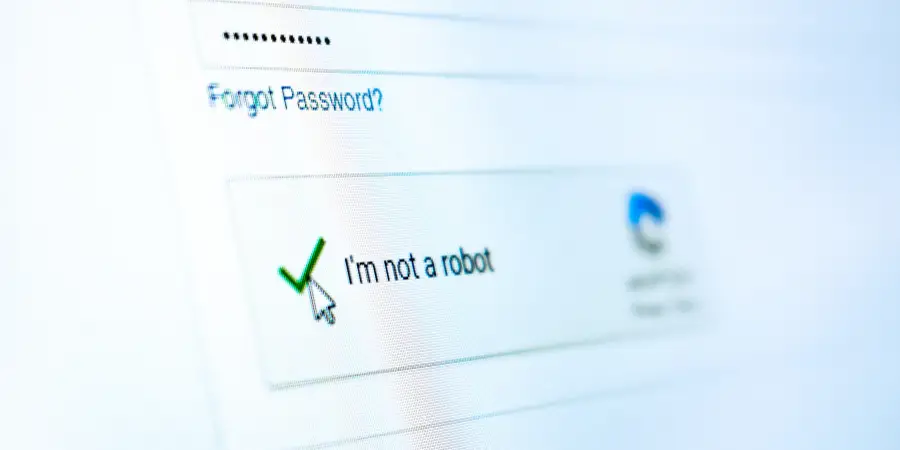If you’ve spent any amount of time browsing the internet with Google Chrome, you’ve probably come across some random points where you’re met with a little box asking to confirm that you’re a human.
Sure, it might have seemed a little weird the first few times, but now you’re most likely used to seeing it. However, you might not be familiar with the inner workings behind it and we’ve got you covered today.
These prompts are actually called CAPTCHA (Completely Automated Public Turing test to tell Computers and Humans Apart), and they are basically the reverse of a Turing test where you’ll need to prove you’re not a machine.
Google has CAPTCHA prompts that are generated when certain websites want to remain secure from suspicious activity. Naturally, this is expected because the internet is an often unpredictable place with tons of problems coming up with websites that lack a level of security.
How does Google CAPTCHA know when to generate a prompt?
There are numerous reasons behind prompt generations on Google CAPTCHA and we will go through them over the course of this guide.
Additionally, we will also provide solutions if you feel like your Google Chrome browser has been generating CAPTCHA prompts a little too often.
Some websites have automatically been designed to generate CAPTCHA proactively in order to defend against bots.
These websites are usually the types that tend to be targeted by users who intend to perform malicious activity. For example, social media sites and chat related applications will be subject to suspicious users attempting to scam real users.
Therefore, CAPTCHA is strategically added to random points in the user experience. For example, Trustpilot will use CAPTCHA for users when they sign in to confirm their realness.
Additionally, a CAPTCHA can also be triggered to prompt a user when their behavior is similar to a bot’s. This is usually based on how often a user tends to request web pages and click on hyperlinks i.e. at a higher rate than the average person.
Furthermore, there are situations where your IP address is identified as a bot by the website’s detection algorithms, making it difficult to avoid a CAPTCHA prompt.
Similarly, your Google account may not belong to a real person according to their detection, so the extra measure with a CAPTCHA is helpful in ensuring what to do about a situation.
There are still bots that are capable of passing a CAPTCHA test. With research conducted by internet enthusiasts, they have shown that it is possible to write programs that are capable of solving image recognition CAPTCHAs.
How to turn off Google Chrome CAPTCHA Prompts?
While CAPTCHA might be an annoying thing to encounter, there’s also a tendency for it to be helpful to the website owners. Regardless if you’re reading this article, you’re probably not a bot. Rather, you’re most likely dealing with one too many CAPTCHA prompts that are interfering with your browsing experience.
AdBlock
The AdBlock extension on Google Chrome is one that will enable you to skip some CAPTCHA prompts that appear on the search engine application. In order to install it, follow these steps:
- Visit the Chrome Web Store
- Use the search bar and type in “AdBlock”
- Select the version made by getadblock.com and click on Add to Chrome
This Chrome extension is very good at avoiding some particularly annoying CAPTCHA prompts, so your browsing experience can quickly start to feel more seamless once it is installed.
Buster: CAPTCHA Solver for Humans
There’s a way to avoid the hassle of figuring out the puzzles generated by the CAPTCHA prompts. Buster is a CAPTCHA solver that could help relieve some stress and get the work off your hands.
As a Chrome Browser extension, it is pretty convenient and highly admired with 4/5 stars on the Chrome Web Store.
It is not guaranteed that Buster will always solve CAPTCHA puzzles correctly, but its presence is one that will undeniably make your time using the Chrome Browser a bit easier.
Buster is able to solve reCAPTCHA challenges by doing the audio prompts rather than the images. In order to install it, the following steps should get you started:
- Visit the Chrome Web Store
- Use the search bar and type in “Buster: Captcha Solver for Humans”
- Select the application with 300,000+ users and click on Add to Chrome
Don’t use a VPN
A great way to avoid triggering any bot detection algorithms would be to avoid using a VPN as that can trigger some authentication issues within the Chrome browser.
Why CAPTCHA is integrated in the Google Search Engine
According to a post by the Google Security Blog, CAPTCHA is so integrated in the search engine due to the vulnerability of many areas of the internet.
Rather than building complicated software to completely eliminate the chances of penetration attempts, the CAPTCHA system provides a solution that makes automated processes face a hard time before any attempt to gain access to the CAPTCHA system.
Search Worms were originally the main target of the CAPTCHA system, and upon Google’s analysis of these worms, it was discovered that there were patterns that usually existed to determine whether or not you were dealing with a malicious program.
Once a worm successfully compromises a web server and creates a channel, they can remotely control these web servers and use them to launch DDoS attacks, spam or engage in phishing.
With CAPTCHA, Google completely avoids the first stage of the problem which is the initial penetration of the system. Although CAPTCHA is not a guaranteed solution, it makes life difficult for people who intend to mess with the data of innocent users browsing the internet.
While you may find it annoying to deal with, we believe that CAPTCHA is a necessity in the grand scheme of things. In the future, we could see human verification systems that require more personal information, and that could be even more dangerous for users.


